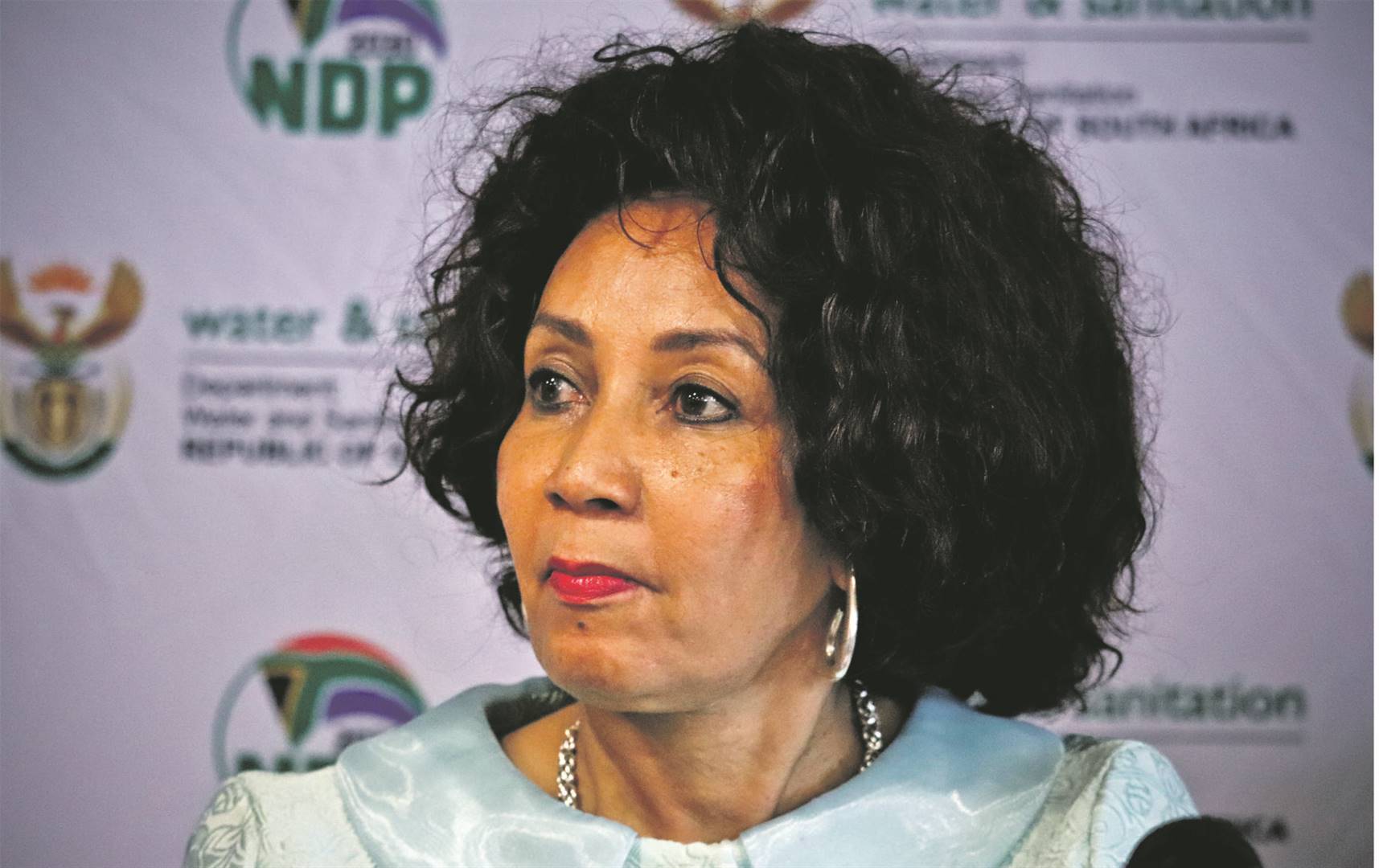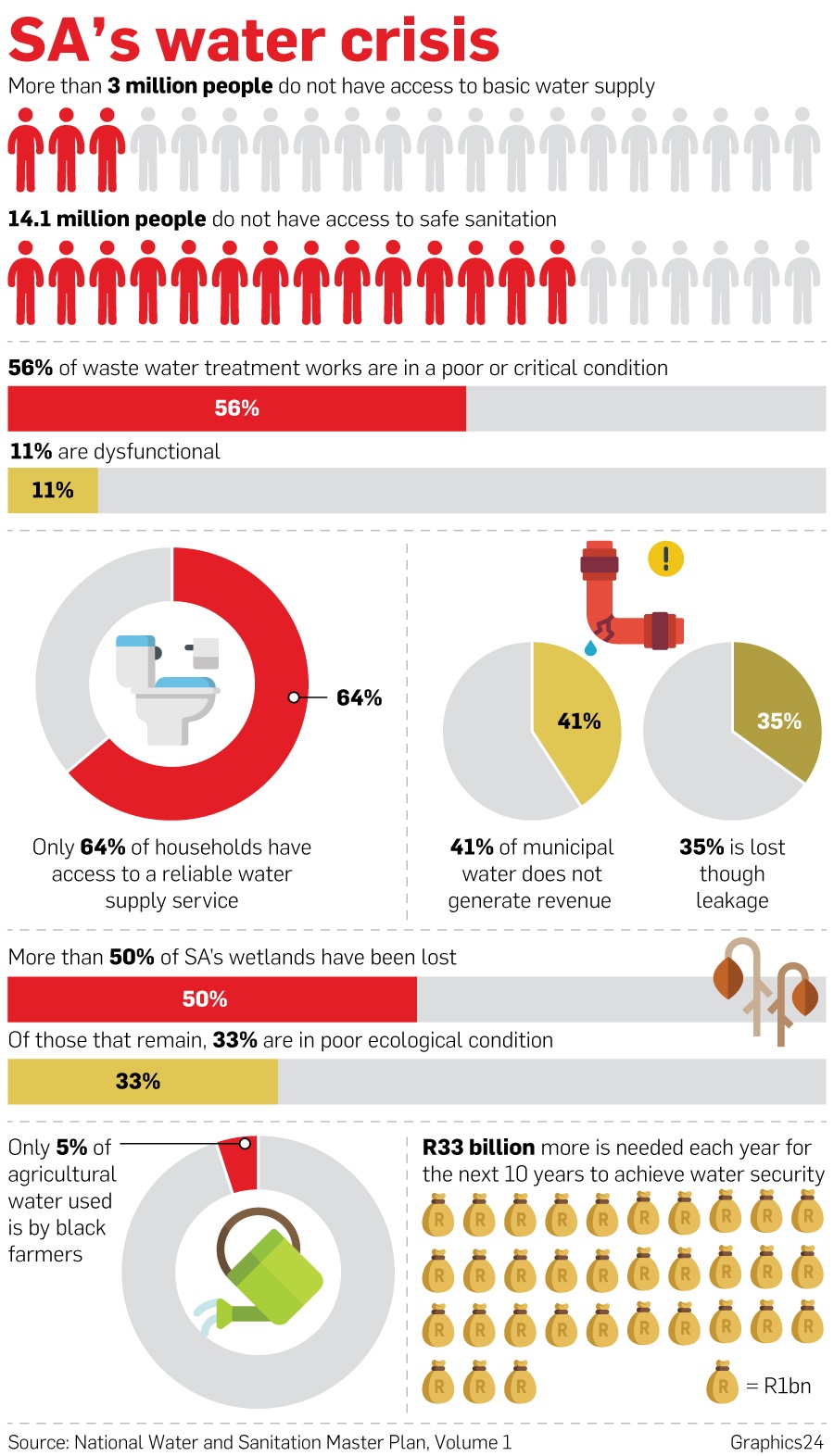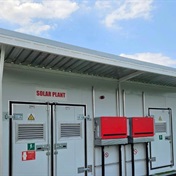
Sisulu sounds the alarm as the worsening crisis sees demand for water far outweigh supply
While commending Human Settlements, Water and Sanitation Minister Lindiwe Sisulu on the national water and sanitation master plan, Professor Anthony Turton, of the University of the Free State’s centre for environmental management, said it still did not answer one important question: Where will the water come from?
“What concerns me about this plan is that they talk about institutions, investments and innovation, but nowhere do they talk about where we are going to get water from. I mean, we ran out of water in 2002. It’s all good and well to talk about making institutions stronger, but where is the water going to come from?” Turton asked.
During the launch of the master plan this week, Sisulu said insufficient water infrastructure maintenance and investment, recurrent droughts, inequality in access to water and sanitation, deteriorating water quality and a lack of skilled water engineers were some of the causes of the water crisis the country was dealing with.
With a number of issues to address, the master plan offered a glimmer of hope as it claims the country could avoid a projected water deficit.
“With respect to the bulk water resources on which the country depends, it is projected that demand will grow by 17% by 2030,” Sisulu said, and, according to the master plan, “South Africans can avoid” this water deficit.
Sisulu said the document comprised action plans that would be put in place to save water.
“This document outlines a series of urgent steps to be taken and implemented by all stakeholders in the water sector to address systemic and infrastructural challenges, and to secure a continuous and uninterrupted supply of water for both communities and businesses use,” she said.
On some issues, Sisulu noted with concern the importance of “educating our people about the necessity to clean [and to keep clean] our rivers”.
This sentiment stems particularly from the polluted Vaal River – which is one of the country’s main water sources. Earlier this year, Sisulu’s department announced that 2 000 jobs would be created once projects designed to solve the crisis were up and running.
“A clean-up campaign of rivers should help us with this. Through a partnership between ourselves and the department of environmental affairs, as well as communities, an initiative where we clean our rivers on a regular basis should drive this,” she said.
According to Sisulu, water and sanitation management were also major issues confronting the sector, with reducing water demand and increasing supply being one of the department’s objectives.
“On average, each person in the country uses 64 litres a day more than the global average of 173 litres a day.”
Some of the reasons the department has blamed for the disparity in demand and supply include the climate emergency, which has led to less rain and extended droughts; old infrastructure; pollution; wastage of water as a result of leaks in homes, in streets and at large water plants; and a growing population.
“The water available per person in the country decreases as the population increases,” Sisulu said.
Actions to be taken by the department in an effort to rectify the gap between demand and supply include developing strategic water resource infrastructure, increasing groundwater use and reuse of water, and setting caps on water use.
The master plan, which Sisulu said would cost more than R900 billion to implement over the next 10 years, is intended to bring some relief to the country’s water crisis.
The situation has worsened drastically over the past few months:
. In August, protests erupted in Butterworth in the Eastern Cape after residents had been without tap water for more than a week.
. Late last month, the town became one of many in the province that reached “day zero” after it was hit by a severe drought, which resulted in the provincial cabinet declaring it a disaster area.
. Similarly, in October, residents of Hammanskraal in northern Pretoria were without water for more than a week after the City of Tshwane announced the temporary shutdown of the Temba Water Treatment Plant.
. In October in the Northern Cape, residents in the Sol Plaatje Local Municipality, like many others across the country, were distressed as hospitals and schools in Kimberley closed because of water shortages.
However, Turton said the amount of money needed by the sector was colossal.
“The fact that we need almost R1 trillion just to get the water sector going again is astonishing. That is a big number and the question now is, how is that money going to be raised, because the fiscus is unable to provide that money? It is a serious situation to be almost R1 trillion down the hole,” he told City Press.
Turton commended the minister for her call for public-private partnerships, as well as for her hands-on approach regarding efforts to curb corruption in her department.
“I am very encouraged by the minister for a couple of reasons. The first is that she has made mention of public-private partnerships and I think that is where that R1 trillion is going to come from,” Turton said.
“The other thing is that, having inherited a department that was in very bad condition, she seems to be taking the corruption bull by the horns.”
Turton’s statement relates to Sisulu’s vow to turn around the bankrupt department, which became dysfunctional in many respects when Nomvula Mokonyane was minister. Sisulu was appointed to the post earlier this year.
Emphasising her drive to eradicate corruption in her department, Sisulu said that “ethical leadership” would be imperative in ensuring that the goals set out in the master plan were carried out.
“Some of the key strategic objectives of the master plan include structuring the department to make it fit for purpose, and eliminating wastage and any loss due to corruption and mismanagement of resources,” she said.
“The most critical aspect of executing the master plan will be to ensure that there is leadership to carry it out. Not just leadership, but ethical leadership by ownership, commitment and professionalism.”
Last month, City Press reported on how small-scale farmers were desperate for help from government to save their livestock as the drought continued to ravage large parts of the country.
At the time, AgriSA gave the country an idea of how severe the drought was by using the hardest-hit province – the Northern Cape – as an example of the devastation.
According to the master plan, “agriculture uses the most water in South Africa and pays the lowest tariff, with 61% of the water usage in the country going to agriculture irrigation”.
“Agricultural consumption is largely unmetered, and there are concerns about unauthorised abstraction and water wastage in the sector.”
On the issue of farming and water user licences, Sisulu said: “We are going to indicate how best to make water accessible to emerging black farmers.
“The issuing of water user licences has also been one of the challenges because of the length of time that it has taken to process these licences.
“I have been reliably informed that the department has cut down on the time that is spent dealing with permits. The turnaround time is now 49 days, based on all documents being submitted correctly and subject to all other processes being followed.”
TALK TO US
How would you feel if permanent water restrictions were put in place while the country adapts to more ‘water friendly’ behaviour?
SMS us on 35697 using the keyword WATER and tell us what you think. Please include your name and province. SMSes cost R1.50. By participating, you agree to receive occasional marketing material
 |
| ||||||||||||
| |||||||||||||




 Publications
Publications
 Partners
Partners









